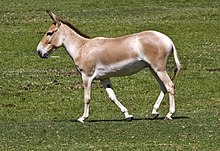
Back Perdagtiges Afrikaans Equidae AN خيليات Arabic خيليات ARZ Equidae AST Okol (Equidae) AVK Atlar Azerbaijani Ат һымаҡтар Bashkir Коневыя Byelorussian Коневыя BE-X-OLD
| Equidae | |
|---|---|

| |
| Persian onager | |
| Scientific classification | |
| Domain: | Eukaryota |
| Kingdom: | Animalia |
| Phylum: | Chordata |
| Class: | Mammalia |
| Order: | Perissodactyla |
| Superfamily: | Equoidea |
| Family: | Equidae Gray, 1821 |
| Subfamilies | |
Equidae (commonly known as the horse family) is the taxonomic family of horses and related animals, including the extant horses, asses, and zebras, and many other species known only from fossils. The family evolved more than 50 million years ago, in the Eocene epoch, from a small, multi-toed ungulate into larger, single-toed animals. All extant species are in the genus Equus, which originated in North America. Equidae belongs to the order Perissodactyla, which includes the extant tapirs and rhinoceros, and several extinct families. It is more specifically grouped within the superfamily Equoidea, the only other family being the extinct Palaeotheriidae.
The term equid refers to any member of this family, including any equine.
- ^ "PBDB". Paleobiology Database. Retrieved 2021-07-18.
- ^ Secord, Ross; Bloch, Jonathan I.; Chester, Stephen G. B.; Boyer, Doug M.; Wood, Aaron R.; Wing, Scott L.; Kraus, Mary J.; McInerney, Francesca A.; Krigbaum, John (2012), Evolution of the Earliest Horses Driven by Climate Change in the Paleocene-Eocene Thermal Maximum, Science, p. 959-962, doi:10.1126/science.1213859